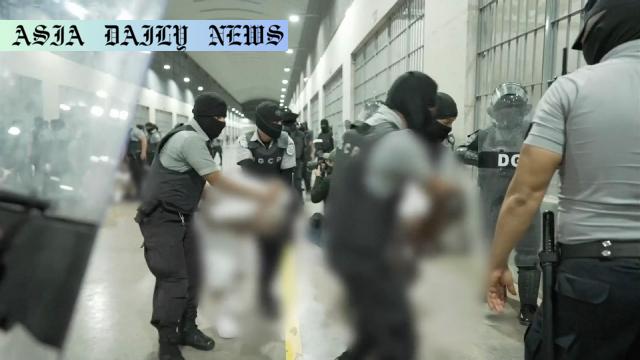Alien Enemies Act: Trump invocations led deportation of alleged Venezuelan gang members despite court orders blocking action.
- Alien Enemies Act invoked to deport Venezuelan gang members.
- Court orders halt the deportations but action continues.
- Salvadoran President agrees to house deportees in local jails.
- Controversy grows with US administration defying judiciary.

Introduction: Trump’s Controversial Use of the Alien Enemies Act
The recent invocation of the Alien Enemies Act by United States President Donald Trump has sparked heated debates and legal confrontations. This rarely used wartime legislation was invoked to target alleged Venezuelan gang members residing in the US. The controversial decision has highlighted the tensions between the Trump administration and the judiciary, as federal courts have already issued orders to block deportations. However, despite these legal restraints, the administration has continued its aggressive actions. With 238 alleged gang members already deported to El Salvador and more flights planned, the political and humanitarian implications are unfolding at a rapid pace.
Understanding the Alien Enemies Act
The Alien Enemies Act, originally enacted in 1798, grants the US President sweeping powers during wartime to detain or deport non-citizens from adversarial nations without typical judicial oversight. Historically, this legislation has been sparingly used, including during World War II when Japanese immigrants and others were detained under its provisions. Its application in the modern geopolitical landscape marks a significant and controversial departure from its historical usage. By invoking the act, the president can bypass customary legal procedures, raising concerns about constitutional safeguards and human rights.
The Deportation of Venezuelan Gang Members
President Trump justified the invocation of the Alien Enemies Act by labeling Venezuelan gang members as a direct threat to national security. The administration specifically targeted members of the Tren de Aragua, a notorious criminal organization. The US government, in coordination with El Salvador, deported hundreds of these individuals, who were received by the Salvadoran government and placed into their prison system. Salvadoran President Nayib Bukele welcomed the deportation, stating that it bolstered his country’s efforts to combat organized crime. However, the legal and political maneuvers behind these deportations have drawn sharp criticism from various quarters, marking a troubling precedent.
Legal and Human Rights Implications
The federal court’s order temporarily halted deportation flights under the Alien Enemies Act, pointing out the lack of fulfilled preconditions necessary to justify its invocation. Legal experts argue that the law requires clear wartime conditions for its use, which are absent in this case. Moreover, rights organizations have expressed grave concerns over the treatment of migrants and the potential bypassing of due process. Critics emphasize that alleged gang members, like any other individual, are entitled to a fair hearing under international and domestic laws, and bypassing these protections undermines the rule of law.
The Political Fallout and International Reactions
The invocation of the Alien Enemies Act has also resulted in political upheaval within the United States, as well as strained international relations. Domestically, the stark division between the Trump administration and the judiciary reflects broader institutional disagreements about immigration policy and executive power. Internationally, the deportations to El Salvador have been viewed as a unilateral action that undermines global norms. While El Salvador has agreed to house these deportees, questions remain over the nation’s capacity to address the influx of suspected gang members and the potential societal fallout.
Conclusion: A Worrying Precedent
The Trump administration’s use of the Alien Enemies Act to deport individuals raises critical questions about the limits of presidential power, the role of the judiciary, and the standing of human rights under US law. The controversial decision has not only reignited debates about immigration policies but has also set a worrying precedent for future use of wartime legislation during peacetime. As the legal battles continue and public scrutiny intensifies, the extent of the political and humanitarian ramifications of this decision remains uncertain.



Commentary
Legal and Humanitarian Concerns Surrounding the Alien Enemies Act
The Trump administration’s recent use of the Alien Enemies Act has reignited discussions about the balance between national security and individual rights. What stands out in this case is the speed at which alleged gang members were deported without proper adjudication. This bypass of the judiciary raises concerns about due process and constitutional safeguards, especially in cases involving individuals who may face dire consequences in their home countries. The historical use of this legislation to unfairly target certain groups should serve as a warning about its broader implications and potential misuse in politically charged environments.
The Political and Ethical Ramifications
From a political standpoint, the move by the Trump administration signals an aggressive approach to immigration that prioritizes swift action over careful deliberation. While the administration has justified its actions by citing perceived threats to national security, the invocation of a legislation historically tied to wartime and systemic injustices feels like a heavy-handed measure. Additionally, the deportation of individuals to El Salvador, a country already grappling with its judicial and prison crises, raises ethical questions about the burden placed on foreign nations in addressing US domestic policies.
The Need for Comprehensive Immigration Reform
This incident underscores the urgent need for comprehensive immigration reform in the United States. Rather than invoking archaic wartime laws that bypass judicial scrutiny, the government should focus on enacting policies that balance security with the protection of rights. Transparent and fair legal procedures must remain at the core of any democratic system. The ongoing controversies surrounding the Alien Enemies Act serve as a reminder of the fragility of civil liberties when executive power goes unchecked, making a robust dialogue on immigration more critical than ever.